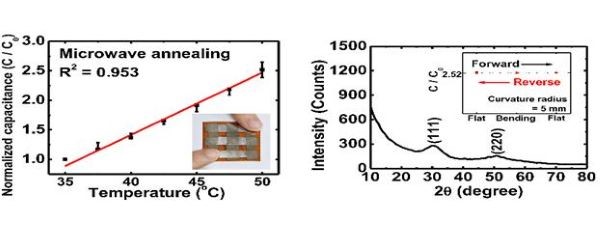Professor Ha Taejun ‘s Research Team Develops a YSZ-based Capacitive Wearable Temperature Sensor
- admin
- 2025-01-21
- 2237
· Professor Ha Taejun (Department of Electronic Materials Engineering)‘s Research Team Develops a YSZ-based Capacitive Wearable Temperature Sensor
115 views | Created on 2025.01.06 | Modified on
2025.01.06 | Public Relations Team
·
Professor Ha Taejun (Department of Electronic Materials Engineering)‘s
Research Team Develops a YSZ-based Capacitive Wearable Temperature Sensor
-
Published in Top-Tier Journal in the Field of Compound and Alloy-Based
Materials Science, Journal of Alloys and Compounds
(IF: 5.8, Top 8.3% in JCR Ranking) -

(Left)
Kim Chaeun, Master's student, (Right) Ha Taejun, Professor
Professor Ha Taejun (Department of Electronic
Materials Engineering) and his research team have developed a YSZ
(yttria-stabilized zirconia)-based capacitive wearable temperature sensor by
applying an optimized all-solution process. They also successfully implemented
an interactive sensor capable of detecting real-time touch using body
temperature.
The
results of this research were published in Journal of Alloys and Compounds (IF:
5.8, Top 8.3% in JCR ranking), a leading journal in the field of materials
science for compounds and alloys, under the title "Capacitive-type
wearable temperature sensors based on yttria-stabilized zirconia films
fabricated via microwave-assisted all-solution-process and their application
for detection of touch stimuli" (Reference:https://doi.org/10.1016/j.jallcom.2024.178334).
Temperature sensors capable of real-time body
temperature monitoring have garnered significant scientific interest in the
field of healthcare monitoring systems. In particular, capacitive temperature
sensors composed of high-dielectric constant metal oxide thin films are highly
advantageous for wearable electronic devices due to their simple device
structure, high thermodynamic stability, and excellent mechanical robustness. However,
since the sensing performance of capacitive wearable temperature sensors is
significantly affected by quasi-free carriers (QFC) depending on the
crystallinity of the insulating layer, it is crucial to develop metal oxides
with high dielectric constants and excellent insulating properties for use as
the insulating layer. Recently, extensive research has been conducted in this
area; however, the process of controlling the crystallinity of metal oxide thin
films typically requires high-temperature heat treatment, which inherently
limits their application and use on flexible substrates.
In response, Professor Ha Taejun (Department of
Electronic Materials Engineering) and his research team developed a
high-performance capacitive wearable temperature sensor based on the metal
oxide YSZ using an optimized all-solution process with a low-temperature
annealing technique. The fabricated capacitive temperature sensor exhibited
high crystallinity based on surface potential and demonstrated a high
sensitivity of 38.76 pF/°C within the temperature range of 35?50°C, which is
close to body temperature. In addition, the sensor demonstrated excellent
operational stability over 30 days, high response/recovery speed, low
operational hysteresis, and outstanding mechanical stability under repeated
bending with a curvature radius of 5 mm. Finally, leveraging the
characteristics of the YSZ-based wearable temperature sensor capable of
detecting temperatures within the body temperature range, the research
demonstrated its potential application in healthcare monitoring systems by
enabling touch detection based on body temperature.

Temperature sensing performance of the YSZ
insulating layer-based capacitive temperature sensor,
analysis of the crystallinity of optimized
all-solution-process YSZ thin films in flexible temperature sensor arrays, and
operational stability under 5 mm bending
This research was conducted solely by Professor Ha
Taejun and his research team. It is a result of the Interactive Display
Research Center, where Professor Ha serves as the director, under the
University Innovation Future Challenge Project. Additionally, it was supported
by the Carbon Neutral Industrial Core Technology Development Project, overseen
by the Ministry of Trade, Industry and Energy. Professor Ha Taejun is
conducting extensive research on next-generation electronic devices, as well as
sensors and energy devices, based on advanced materials. He has published over
80 papers in SCI journals and holds more than 20 international and domestic
patents related to this field. In addition, first author Kim Chaeun achieved
the accomplishment of publishing a paper in a top-tier international journal
within the first semester of her master's program.